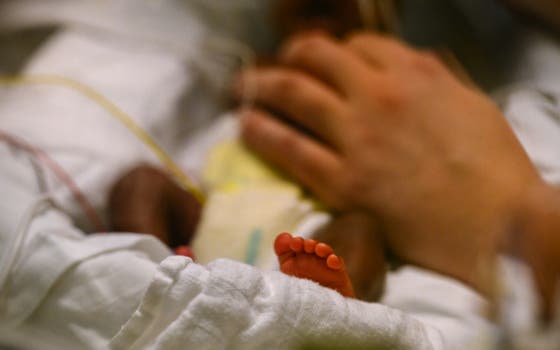New associate professors hold lecture

At UMC Utrecht, five researchers have been appointed associate professor within the Child Health strategic theme. The new associate professors hold their celebratory lectures today at the WKZ. This group of talented researchers is appointed associate professor because of scientific achievements and qualifications in research, teaching, and management. Their research themes are very different.
Marie-Luisa Tatarannoo, neonatologist and associate professor will take us through her research. Every year, babies are born prematurely. During their critical brain development period, they are admitted to the neonatal intensive care unit (NICU), separated from their parents. Here, babies repeatedly experience painful and stressful stimuli. Experiencing stress and pain can have negative effects on neurodevelopment for some babies. Despite advances in neonatal care, it remains difficult to individually predict the long-term outcome for these neonates. As a result, it is not possible to initiate therapies soon.
Maria-Luisa will tell the audience about new algorithms based on large databases and machine learning. The use of these algorithms is likely to improve the future of prediction and prognosis in this high-risk population. She will also present patient-tailored therapies targeting pain and stress that reduce the negative effects on brain development.
Joost Swart, pediatric rheumatologist, immunologist and associate professor talks about his daily work. His research focuses on juvenile rheumatoid arthritis, the most common rheumatic disease in childhood. Together with senior researcher Sytze de Roock and a total of more than 50 students and 8 PhD students, his epidemiological research often directly impacts patients with juvenile rheumatism and their families. Local, national and international collaborations have already led to large cohorts with data from 9,000 children with juvenile rheumatoid arthritis (Pharmachild).
The latest infrastructure Joost is leading together with Bas Vastert and 2 Canadian colleagues (UCAN CAN-DU) already contains data and blood samples from about 2000 juvenile rheumatoid arthritis patients. With this, they are building self-learning algorithms that help create personalised treatment plans for patients.
Marije Bartels, pediatric hematologist and associate professor explains the focus of her research. She has become increasingly interested in rare inherited blood diseases, especially congenital anaemia and bone marrow failure. The complex biology, clinical heterogeneity and limited treatment options motivate her every day to contribute to new developments both in the consulting room and in the laboratory. She will take the public into the world of Diamond-Blackfan Anaemia syndrome; from the patient to the cell, from disease model to a potential new treatments.
Bart Bartels, pediatric physical therapist and associate professor, focuses on the causes of exercise intolerance and fatigue in children into adulthood with a muscle problem. He validates new outcome measures for natural course studies and trials, and he develops physical training programs.
Bart’s ambition is to make new (combination) treatments available for children with rare muscle disorders. Current projects contributing to this are the development of a muscle passport, two randomized controlled trials on the effect of breathing muscle training, strength training, the validation of Goal Attainment Scaling and home monitoring of muscle function with Artificial Intelligence.
Finally, Stefaan Tytgat, head of the pediatric surgery department at the Wilhelmina Children’s Hospital and associate professor, will take us through his research. He is specialized in minimally invasive surgery in neonates and children, with a focus on the treatment of congenital oesophageal and respiratory disorders (oesophageal atresia, tracheomalacia). Stefaan explains how the future of care for this particular patient group can be improved through collaboration with all practitioners at WKZ.
